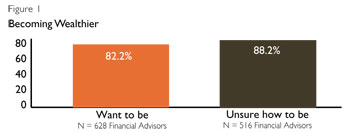If the title of this column piqued your curiosity, then you are probably among the large majority of advisors that wants to be wealthier. Our experience with advisors-actually every group of individuals regardless of their profession-tells us that most people like the goal of getting rich, in theory. The stumbling block is their lack of knowledge about the behaviors, mindsets and actions that result in greater wealth. In a recent survey of more than 600 advisory professionals, about four out of five said they want to be wealthier. But nearly 90% admit they are uncertain about how to turn their desire into a reality (Figure 1). It's worth noting that other financial professionals such as insurance agents, accountants and attorneys exhibit similar characteristics.
Implementation Over Insight
Although the desire to get rich is virtually ubiquitous, it's a goal few people succeed in attaining. But our research tells us that failure is not due to a lack of technical competence. Most advisory professionals have the experience and expertise to do their jobs well. They also have at least a cursory understanding of how they can be more effective and efficient. Many of these skills are integral to the successes of the ultra-affluent and at the heart of Money Rules. As we've said repeatedly, the core behaviors of the super-rich are not secret. The bigger mystery is how to apply them in the context of your life and practice. The reason the financial elite hire us is not to educate them on the Money Rules but to help them use the rules on a systematic and consistent basis.
Money Rules For Advisors
In this column (and in our new book, The Family Office: Advising the Financial Elite) we've discussed Money Rules that translate into significant wealth, focusing specifically on how they are applied by billionaires and centimillionaires. In this edition of the column, we'll consider how advisory professionals can employ the Money Rules.
#1: Commit To Extreme Wealth. To get seriously rich, you have to want to get seriously rich and be willing to commit the necessary time and resources. A good way to start is by identifying your personal financial goals. How much do you want to be worth? How much money do you want to earn next year? Once you're comfortable with your ultimate goal (recognizing that this is often a moving target that inches upward as you achieve successes) you can focus on the milestones that will enable you to achieve your ultimate objectives.
When we ask people what they would do to become extremely wealthy, the usual answer is "anything." After we do some probing, however, we quickly discover that people are willing to do a lot less than "anything." A better way to think about these rules is to decide what you won't do. Each person has a moral code. Know when and where you draw the line.
#2: Engage In Enlightened Self-Interest. To get seriously rich, you have to remain focused on your goal and avoid getting derailed by distractions, such as the chance for group happiness or pleas for fairness, and poor decision-making. Burning others is not the objective. Obtaining the best strategic and financial outcome in every business situation is, and that requires a detailed knowledge of your business finances. In our experience, very few advisors have done the math (or do it when faced with a business opportunity) and rely instead on a "gut feel" when making decisions.
Using this logic, it's essential to know the ins and outs of your business model. Where are you making your money? Which methods of sourcing affluent clients are the most profitable? It's almost impossible to negotiate favorable working arrangements without a clear sense of your P&L statement (or something close). Without that information, you can fall into the trap of negotiating against yourself.

#3: Put Yourself In The Line Of Money. To get seriously rich, you have to concentrate your skills and talents in the endeavors that offer the highest returns. In the financial advisory business, for instance, working with the financial elite is typically a more lucrative path than servicing a mass-market clientele. How would increasing the average net worth of your clients impact your bottom line? What would it take to actively upgrade your clientele?
At the same time, you should consider ways to maximize the profitability of your wealthier clients. The most successful and reliable method has been the adoption of a wealth management approach enabling advisors to deliver a broader array of products and services. The next evolutionary trend is the migration of elite advisors to a multifamily office model.








